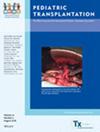对青少年和年轻成人实体器官移植受者使用每日一次的 LCP-Tacrolimus
IF 1.2
4区 医学
Q3 PEDIATRICS
引用次数: 0
摘要
背景青少年和年轻成人实体器官移植(SOT)受者在医疗保健过渡时期的排斥反应和移植物丢失率增加,部分原因是用药依从性差。本研究旨在探讨每日一次的他克莫司制剂 LCP-他克莫司(LCPT)对青少年实体器官移植患者用药依从性的影响。结果29名患者被处方LCPT作为其免疫抑制方案的一部分。20名患者是从速效(IR)他克莫司转为LCPT的;6名患者在移植后立即开始使用,3名患者因保险拒绝而无法接受LCPT。根据医护人员的评估(45.0% 对 68.4%,P = .140)和 MLVI(40.0% 对 71.4%,P = .276),转为 LCPT 的患者在用药依从性方面有所改善,但未达到统计学意义。排斥反应或不良反应的发生率没有差异。结论LCPT的使用并没有显著改善患者的依从性,但却提高了患者的感知依从率和测量依从率。LCPT似乎对SOT受者的管理安全有效;但它可能不会影响药片负担,反而会导致更高的经济负担。可以考虑在部分青少年 SOT 患者中使用。本文章由计算机程序翻译,如有差异,请以英文原文为准。
The use of once‐daily LCP‐Tacrolimus with adolescent and young adult solid organ transplant recipients
BackgroundAdolescent and young adult (AYA) solid organ transplant (SOT) recipients experience increased rates of rejection and graft loss surrounding the time of health care transition, in part due to poor medication adherence. This study aims to examine the impact of a once‐daily formulation of tacrolimus, LCP‐tacrolimus (LCPT), on medication adherence for AYA SOT patients.MethodsA retrospective descriptive analysis was performed for all patients who underwent SOT and were prescribed LCPT after the age of 12 at our single‐center pediatric hospital. Medication adherence was assessed via provider documentation and the medication level variability index (MLVI).ResultsTwenty‐nine patients were prescribed LCPT as part of their immunosuppression regimen. Twenty patients were converted to LCPT from immediate‐acting (IR) tacrolimus; six patients were initiated immediately following transplant, and three patients were unable to receive LCPT due to insurance denial. There was a numeric improvement in medication adherence for converted patients when measured by provider assessment (45.0% vs. 68.4%, p = .140) and MLVI (40.0% vs. 71.4%, p = .276), though these did not reach statistical significance. There were no differences in episodes of rejection or adverse effects. LCPT prescription was not associated with decreased medication burden, and two patients transitioned back to IR tacrolimus due to increased cost.ConclusionsLCPT use did not significantly improve patient adherence; however, it resulted in numerically higher perceived and measured adherence rates. LCPT appears to be safe and effective in the management of SOT recipients; however, it may not affect pill burden and may result in a higher financial burden. Use may be considered for a select group of AYA SOT recipients.
求助全文
通过发布文献求助,成功后即可免费获取论文全文。
去求助
来源期刊

Pediatric Transplantation
医学-小儿科
CiteScore
2.90
自引率
15.40%
发文量
216
审稿时长
3-8 weeks
期刊介绍:
The aim of Pediatric Transplantation is to publish original articles of the highest quality on clinical experience and basic research in transplantation of tissues and solid organs in infants, children and adolescents. The journal seeks to disseminate the latest information widely to all individuals involved in kidney, liver, heart, lung, intestine and stem cell (bone-marrow) transplantation. In addition, the journal publishes focused reviews on topics relevant to pediatric transplantation as well as timely editorial comment on controversial issues.
 求助内容:
求助内容: 应助结果提醒方式:
应助结果提醒方式:


